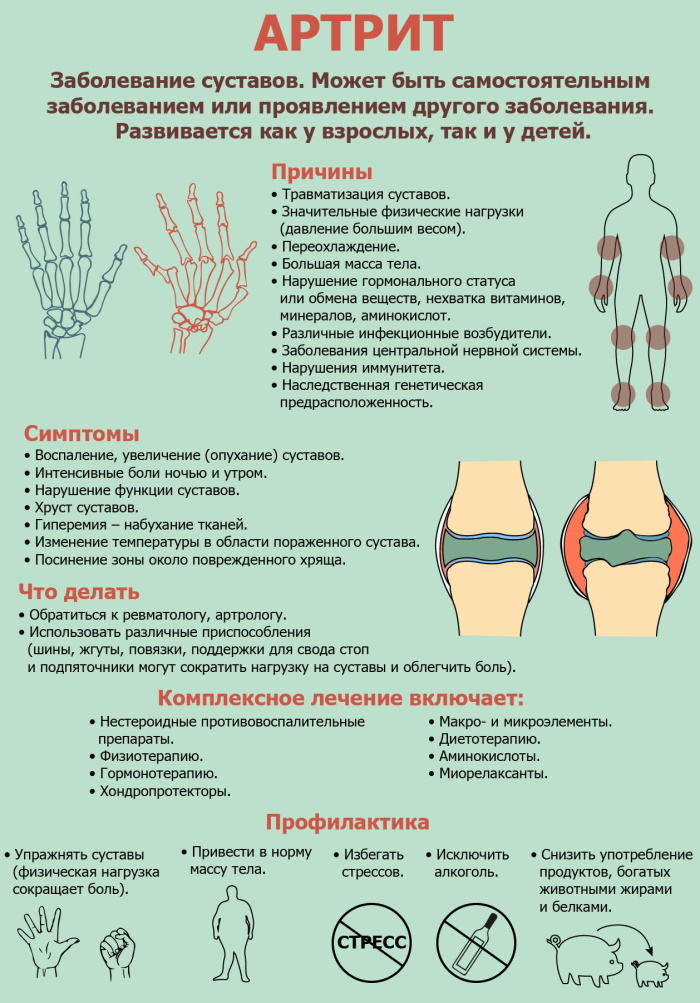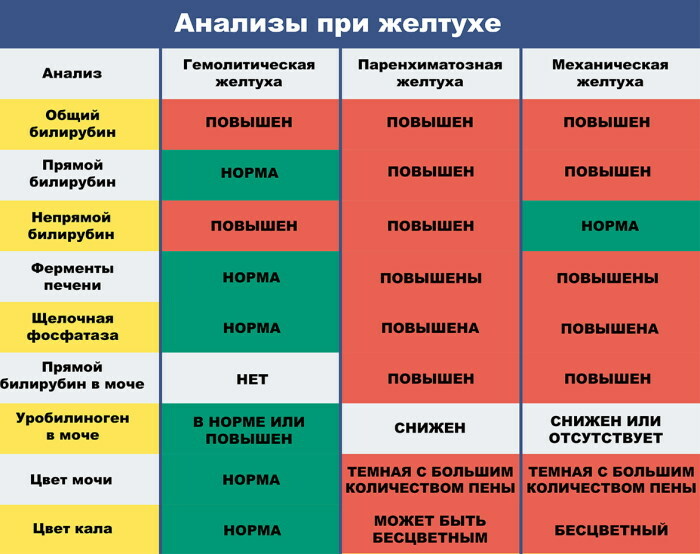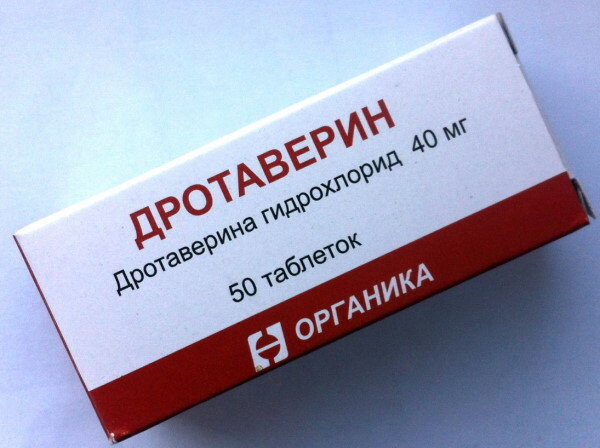Content
- The principle and mechanism of action of beta-blockers
- Classification and generations of beta-blockers
- Clinical pharmacology, indications
- Chronic obstructive pulmonary disease and bronchial asthma
- Diabetes
- Peripheral vascular disease
- Heart failure
- Heart blockages and arrhythmias
- Contraindications
- Side effects
- Precautions and special instructions
- Drug interactions
- The best drugs in the group
- Atenolol
- Bisoprol
- Corvitol
- Obzidan
- Beta Blockers Videos
Beta blockers are a group of medicines used primarily with damage to the cardiovascular system. The mechanism of action of drugs is based on their ability to reduce the load on the myocardium and to alleviate the general condition with an exacerbation of the symptoms of diseases. The funds are used in long courses for chronic pathologies and short ones if the course is acute or a deviation develops against the background of another disorder.
The principle and mechanism of action of beta-blockers
Medicines are a large group of drugs that affect and block beta-adrenergic receptors. As a result, it is possible to achieve a pronounced effect, improve the general condition of patients. Drugs also reduce the likelihood of complications and worsening of symptoms of chronic diseases.
The mechanism of action of drugs is to block beta-adrenergic receptors, which can provoke an increase in blood pressure and other complications.
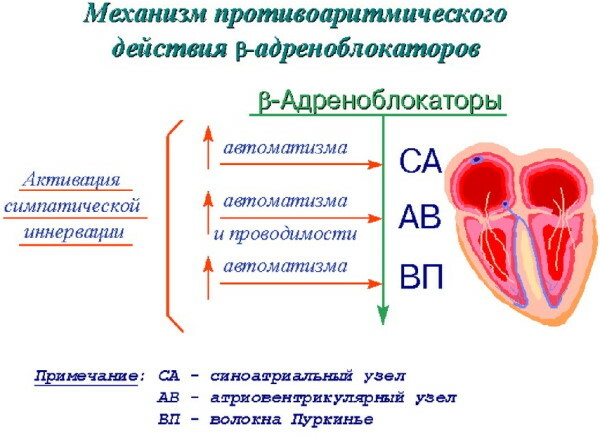
The drugs have different properties:
- Reduces blood pressure in patients with chronic hypertension. Often in such patients, there is a fluctuation in numbers, aggravating the concomitant symptoms from the heart and blood vessels. The tool helps to control indicators and somewhat reduces the likelihood of developing a hypertensive crisis. Such complications often lead to the appearance of additional pathologies on the part of the cardiovascular system.
- Medicines help to improve the functioning of the heart, since they significantly weaken the load on the myocardium, reduce its need for oxygen, which reduces the frequency of contractions.
- They have a beneficial effect on blood circulation, reduce the load on the walls of blood vessels.
- Helps reduce calcium levels in cells.
- They reduce the volume of cardiac output, which also has a beneficial effect on the condition of the heart.
When using the drug, the heart rate decreases, tachycardia attacks develop less often, as well as heart rhythm disturbances. One of the features of the action of drugs is the ability to relieve pressure on the walls of the aorta, which prevents its stratification against the background of the progression of heart pathologies.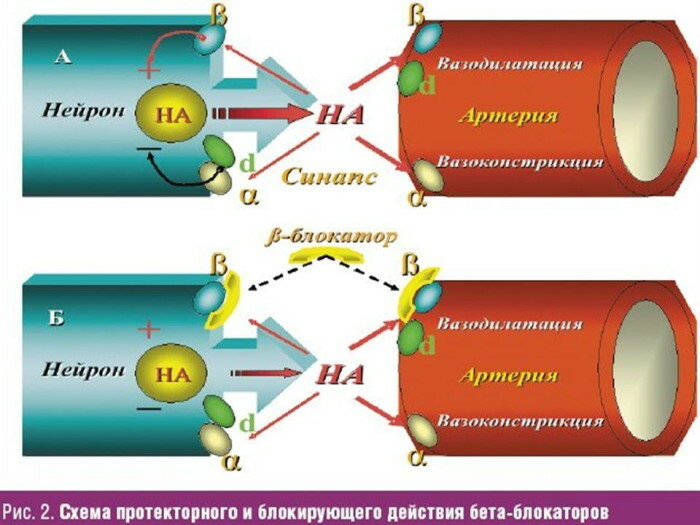
The incidence of sudden death among patients taking beta-blockers is significantly lower than among patients who do not use drugs in this group. For many years, doctors have conducted studies to prove the effectiveness of drugs when used correctly in combination with other drugs.
Classification and generations of beta-blockers
Beta-blockers (the mechanism of action of drugs is based on the direct effect that the agent has on the heart) is divided into 2 groups, each of which has some peculiarities.
| Group of funds | Peculiarities |
| Non-selective | Drugs from this group selectively affect beta-adrenergic receptors and additionally possess pronounced antianginal properties, that is, they help prevent the development of angina pectoris against the background of a lack oxygen. The funds can be used not only for hypertension or heart failure, but also in the case of when the patient has complications from the respiratory system, peripheral vessels, endocrine systems. |
| Cardioselective | Medicines of this group act on type 1 and type 2 beta-adrenergic receptors, which increases their effectiveness in the event that a patient develops disorders of the respiratory system. In this case, the action of the funds depends on the dosage prescribed by the specialist. |
 The drugs do not have generations, since today they often use drugs that have provided a pronounced result for several decades. Depending on the patient's condition and the presence of concomitant abnormalities, the cardiologist selects the most effective medicine from any group.
The drugs do not have generations, since today they often use drugs that have provided a pronounced result for several decades. Depending on the patient's condition and the presence of concomitant abnormalities, the cardiologist selects the most effective medicine from any group.
Clinical pharmacology, indications
When using funds in the event of various diseases, their pharmacological characteristics may differ slightly.
Chronic obstructive pulmonary disease and bronchial asthma
Medicines from the group of beta-blockers do not have a direct effect on the course of pathologies lungs and bronchi, but can block type 2 beta-adrenergic receptors, facilitating the course of pathological states.
That is why drugs are often used in patients with ischemic heart disease of varying severity, accompanied by complications from the respiratory system. The drugs also have a positive effect on the condition of the lungs when diagnosing chronic obstructive organ disease.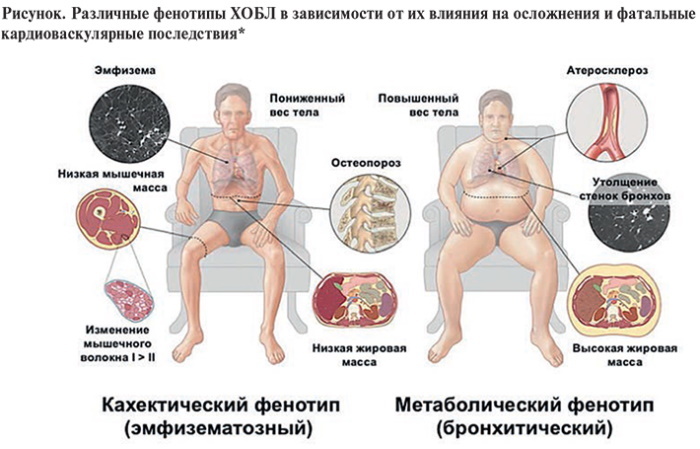
Cardioselective drugs are especially effective for such diseases, which help reduce the likelihood of development of an attack of angina pectoris and at the same time reduce the likelihood of aggravating manifestations from the respiratory systems.
At the same time, some medicines can lead to the development of bronchospasm, so the doctor makes the choice of medicine after a preliminary examination. The dosage during therapy also plays an important role, since the effect is dose-dependent.
Diabetes
Beta-blockers do not have a direct effect on the course of diabetes mellitus, but patients with such a deviation often have concomitant diseases of the heart and blood vessels. The mechanism of action of the drugs involves a decrease in the load on the heart and blood vessels, which leads to an improvement in the condition.
In combination with drugs to lower blood glucose, drugs help improve the condition and significantly reduce the risk of developing complications from the cardiovascular system. Despite the effectiveness of drugs, patients should be more careful about controlling glucose levels, since drugs can provoke a decrease in indicators to critical levels.
Peripheral vascular disease
Preparations from the group of beta-blockers can be used if patients have peripheral vascular pathologies. The instructions for many remedies indicate that such pathologies are contraindications. Experts, however, recommend using only cardioselective drugs that reduce the frequency of the rapid progression of a pathological condition.
Some beta-blockers increase the rate of amputation in patients with severe peripheral vascular disease. For example, Captopril should not be used for such violations.
Heart failure
Medicines are often used to diagnose heart failure, but only if the patient does not develop a decompensated form of pathology. The funds reduce the load on the myocardium, help control blood pressure, which has a beneficial effect on the general condition.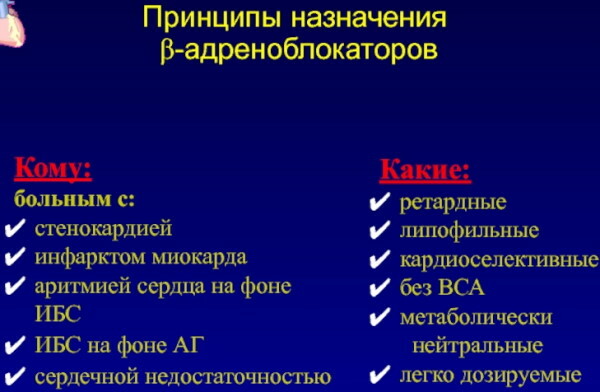
Despite frequent use, in case of frequent occurrence of severe pain in the region of the heart, the drug is not recommended to be prescribed.
Heart blockages and arrhythmias
Beta-blockers (the mechanism of action of drugs may differ slightly for a particular drug) have antiarrhythmic properties, since help prevent heart rhythm disturbances in patients with coronary artery disease, heart failure and some others disorders.
It is important for patients to take into account that with bradycardia of varying severity, the drug can aggravate the condition, as in the case of use in the development of atrioventricular blockade.
Medicines are actively used for some endocrine disorders, for example, with thyrotoxicosis, when patients develop arrhythmia and tachycardia against a background of hormonal imbalance.
Contraindications
Medicines in this group have contraindications that should be considered before prescribing. Treatment can worsen the condition if the patient has any obstacles to it.
The main contraindications:
- Intolerance to the ingredients in the composition of drugs.
- The patient's age is up to 18 years. The drugs can negatively affect the condition of children and adolescents, but their use is usually not required at this age.
- The period of bearing a child and breastfeeding is considered a relative contraindication, that is funds can be used in exceptional cases and only in short courses after the examination specialist.
- Cardiogenic shock and acute myocardial infarction. The ability of drugs to lower blood pressure can worsen the course of the condition.
- Bradycardia, in which the heart rate does not exceed 60 beats / min.
- Persistent hypotension. The remedy can lead to impaired consciousness and other complications when the indicators reach critical levels.
- Internal bleeding against the background of lesions of the mucous membranes of the digestive tract. With such a violation in patients, blood pressure often decreases, and the use of the drug only worsens the condition.
- For some drugs, diabetes mellitus is considered a contraindication, since not all medicines of the group can be used for patients with such complications.
- Severe liver disease, accompanied by organ failure and the development of concomitant complications.
- Severe renal failure.
- Diagnosing sick sinus syndrome.
- Atrioventricular block.
- Depressive state.
- Long course of myasthenia gravis.
- Chronic dermatological pathologies in the acute stage, for example, psoriasis.

For each patient, individual contraindications for treatment can be determined, which are absent in the official recommendations, but are identified during the examination.
Side effects
Beta-blockers, the mechanism of action of which has been studied in detail by specialists, can lead to the development of complications from the cardiovascular system and other internal organs.
The most common adverse reactions are:
- From the side of the heart and blood vessels, complications manifest themselves in the form of pain in the chest area, lowering blood pressure and bradycardia. The condition is aggravated by continuing to take the medication.
- Patients may be disturbed by depression, insomnia or constant drowsiness, headaches. Severe dizziness is observed with a critical decrease in blood pressure. In patients, performance decreases, possibly impaired consciousness, coordination of movements, memory impairment.
- Often, disorders of the digestive system develop in the form of diarrhea, nausea and bouts of vomiting, dry mouth and severe thirst. The condition is aggravated by the addition of bloating, symptoms of flatulence. Patients' appetite worsens, indigestion and pain in the stomach are observed.
- Nasal congestion and bronchospasm can develop with drug therapy. Some medications are used with a history of bronchial asthma, but many of them provoke complications.
- Allergy to drugs from this group is manifested by standard symptoms in the form of a rash on the skin, irritation and flaking, severe itching.
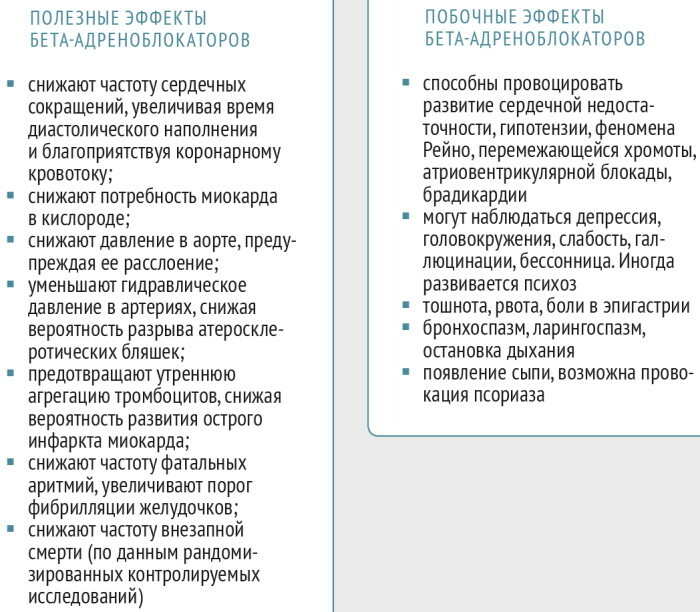
If complications appear, it is recommended to abandon treatment and visit a doctor.
Precautions and special instructions
Medicines are used only as directed by a doctor. If complications and signs of an overdose appear during therapy, you should immediately seek help. You should not ignore the symptoms or use any medications on your own.
Constant monitoring of blood pressure indicators is considered an important condition for beta-blocker treatment. It helps prevent the development of persistent hypotension and other complications against the background of this condition.
The dosage adjustment for each patient is carried out by the doctor individually after the examination. The patient alone cannot change the dose and duration of the course.
Drug interactions
The simultaneous use of medications with calcium channel blockers is prohibited. Treatment in combination with antihypertensive drugs with pronounced properties is not allowed. Sometimes antihypertensive therapy involves the appointment of beta-blockers, but the decision is always made by the doctor after assessing the patient's condition.
Some diuretics are weakened when combined with beta-blockers. In each case, only the cardiologist determines with which drugs the funds of this group can be combined.
The best drugs in the group
Beta-blockers (the mechanism of action is described for each agent in this group in the instructions for use) can have a different composition, but have similar properties. Some medications are most often prescribed because of their high effectiveness.
Atenolol
Cardioselective medication from the group of beta-blockers, available in tablet form for oral administration. Tablets are packaged in blisters of 10 pieces, placed in cardboard boxes of 3 pieces.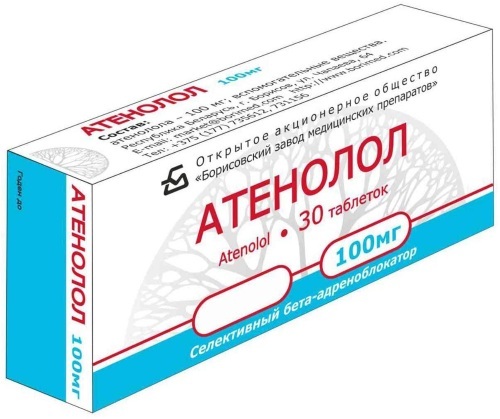
The drug is prescribed for arterial hypertension, heart diseases of varying severity, and some other disorders that occur against the background of such diseases. The price of the medicine ranges from 60-130 rubles.
The tablets are taken orally at a minimum effective dosage of 50 mg. If this is not enough to achieve a therapeutic effect, the dose can be increased to 100 mg, dividing it into 2 doses during the day. When the minimum dose is prescribed, it is consumed 1 time per day at about the same time. The duration of treatment with pills depends on the disease. Some use them for 2-4 weeks, others for a longer period.
Bisoprol
A bisoprolol-based drug produced for patients in the form of tablets taken by mouth. A cardboard package can contain 2 plates of 10 tablets and a description. The tool has pronounced antihypoxic and antianginal properties, helps prevent attacks of angina pectoris and arrhythmias.
Take pills in short and long courses, depending on the severity of the symptoms. The daily dosage usually does not exceed 1 tablet with a dose of 2.5 mg. With a severe course of the disease, it can be increased to 2-3 tablets, which are taken during the day at approximately equal time intervals.
The cost of tablets is affordable and is approximately 80-150 rubles. per packing.
Corvitol
Tableted drug based on metoprolol, which belongs to beta-blockers and has hypotensive, antiarrhythmic, antianginal properties. The medicine is used in the acute and subacute stages of the pathological condition to improve the well-being of patients and prevent complications.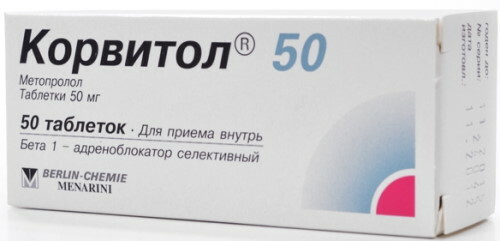
The dosage of the drug per day is minimal, does not exceed 50 mg. This is usually sufficient to obtain a therapeutic effect. But sometimes it is increased to 100-150 mg per day, divided into 2-3 doses during the day.
You can buy a tablet medication for about 280-320 rubles. The package can contain 5 plates, 10 pieces each.
Obzidan
Tablets for oral use based on propranolol, which are beta-blockers with pronounced properties. They are packaged in plates of 20 pieces, placed in cardboard boxes of 3 pieces. Like other drugs from this group, the medication is highly effective and quickly relieves the symptoms of vascular and cardiac pathologies.
The initial dosage of the drug is 1 tablet 40 mg, but the drug can be used at a dose of 120 mg per day, if the doctor considers it appropriate. The specific treatment regimen and dose depends on the disease. The duration of treatment is usually at least 6 weeks, but longer courses may be required if doctors consider it necessary.
Tablets can be purchased at a pharmacy for about 90-140 rubles.
Beta-blockers are a large group of medicines with antianginal and antihypertensive properties. The mechanism of action of drugs is based on the ability of active ingredients to reduce myocardial oxygen demand. The drugs are used according to a scheme that is determined for patients individually, depending on the specific disease.
Beta Blockers Videos
Class 2 antiarrhythmic drugs - beta blockers:

